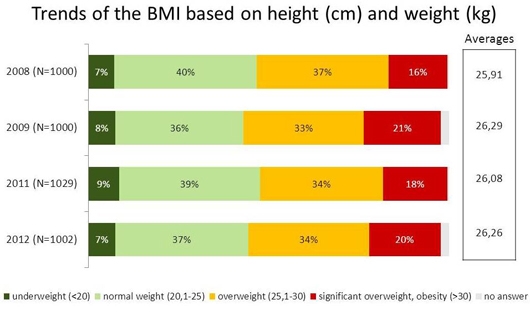Obesity stagnant for the last 4 years
- 2013-02-14 07:30:00
-
Research
Average BMI stays at 26
Szinapszis, a market research company has been monitoring Hungarian public health and awareness since 2008. Based on the most recent survey from the end of last year, the rate of slightly or significantly overweight people in Hungary is rather high at 54% while 20% of them have a minimum BMI (body mess index) of 30.
There is a definite correlation between people’s age and their BMI – an index calculated based on weight and height. Under the age of 26 „only” 22% are struggling with extra weight while 65% of people above 45 are overweight.
Unfortunately, the indicators of obesity have stayed practically the same in recent years. According to annual representative surveys conducted since 2008, the average BMI is around 26 every year.

Chronic diseases – no significant changes either
Similarly to age, a correlation can be found between obesity and chronic diseases as well: 10 out of 7 patients with some kind of chronic health problem have a minimum BMI of 25, while the average is 28 among them. The rate of overweigth people is a little below 50% among adults with no health conditions and their average BMI is 25.
Based on past survey results there has been no change in the scale of patiens with chronic diseases for years. In 2012 40% of the adult public was dealing with chronic conditions, but there are significant differences between age groups: 60% of adults aged 56-65, while 65% of adults aged 65 or older are struggling with chronic conditions. The most common chronic health problems are cardiovascular diseases, mainly high blood pressure (20%), musculoskeletal conditions and diabetes (6-6%).
About the research
Szinapszis Group conducted surveys via phone in December of 2012 examining the scale of people with chronic conditions and weight issues among the Hungarian public. The number of respondents was 1002, the sample is nationwide and representative according to age (18+), sex, region and type of settlement for the entire country. Szinapszis Group monitors the topics mentioned above annually since 2008.














